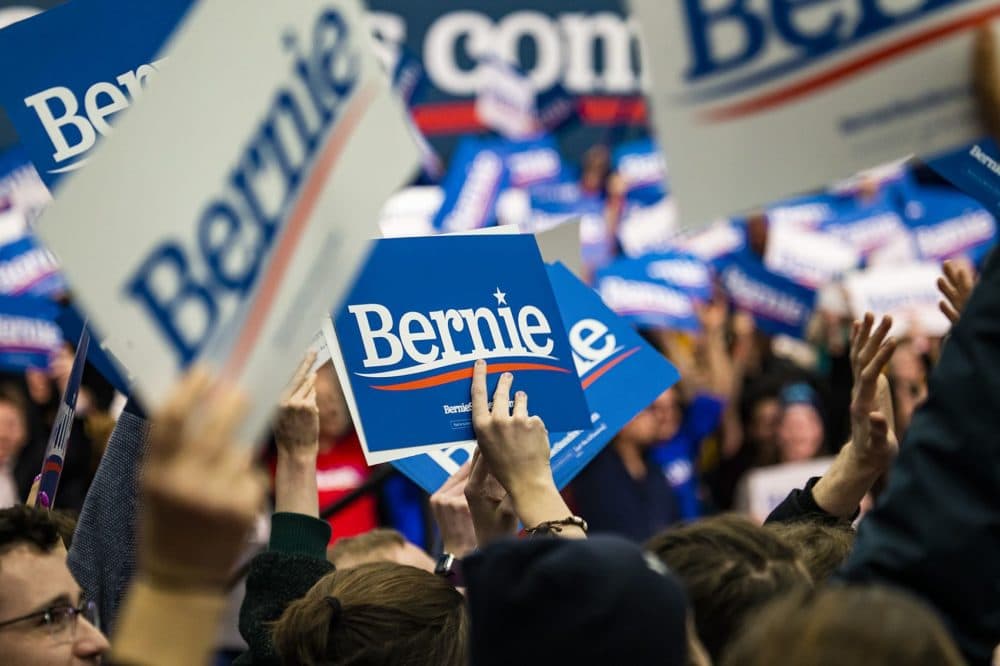Advertisement
Congressman Says Nevada Will Be Bernie Sanders' '1st True Test' With Voters Of Color
Resume
Sen. Bernie Sanders secured victory in the New Hampshire primary on Tuesday. Former South Bend, Indiana, mayor Pete Buttigieg came in a close second, with Sen. Amy Klobuchar coming in third.
Sen. Elizabeth Warren and former Vice President Joe Biden, long thought of as frontrunners, came in far behind at 4th and 5th.
With nearly all of the votes counted, Sanders defeated Buttigieg by fewer than 2 percentage points, in a state where he won by a large margin in 2016 against then-candidate Hillary Clinton.
For Wisconsin Democratic Congressman Mark Pocan, Sanders supporter and co-chair of the House Progressive Caucus, the win was still big for the campaign. He’s confident that the progressive candidate will be victorious in Nevada and South Carolina, more diverse states than Iowa and New Hampshire.
He says Nevada will be “the first true test” of Sanders’ support among voters of color, and points to a recent poll that found Sanders was polling ahead of Biden with black and brown voters.
Interview Highlights
On comparing Sanders’ tight victory this year with his 2016 win in New Hampshire
“Well, there were only a few candidates last time. This time, I think there's at least eight. So we were glad to come out on top. That's the most votes in Iowa, the most votes in New Hampshire, and now we're going to take that to Nevada and South Carolina and Super Tuesday. So I think the fact that Bernie Sanders got the most votes in the first two contests is very significant.”
On the strong support shown for moderate candidates, including Buttigieg and Klobuchar, in this year’s N.H. primary
“I don't think people voted just on ideology. In some cases, people thought someone from the upper Midwest could win in the upper Midwest, so they voted for Amy Klobuchar and people had all different reasons for voting. What we do know about Bernie Sanders is the issues he's advocating for — the Green New Deal, universal health care as a right, raising the minimum wage. All those issues are 60% to 80% support with the public. So we know he's running on issues that resonate well. And he also is the candidate who's got more of the first time voters supporting him. And at the end of the day, in places like Wisconsin, a must-win state, we only win by having new voters come out to make sure that we can have those Electoral College votes go for the Democrat.”
On whether he thinks Sanders’ “Medicare for All” plan could be passed in Congress
“A lot of the pundits and the corporate-funded think tanks in D.C. want to make this be a problem. What's interesting is when they had exit polls in New Hampshire, people said this was one of the biggest issues for them when they went to vote. So real people think [differently] than paid pundits. This is an important issue to them, and that's why it's resonating in Bernie's winning states when it comes to people coming out to vote. So I'm not worried about the political establishment that wants to spin this issue differently. On the ground, real people are concerned about not having health care. And I think that's why Bernie's doing so well and I hope he continues to drive this message home.
“There's no question that politicians are too often listening to special interests in Washington, D.C., but that's not where the public sat. And part of Bernie Sanders' campaign is about building a movement. It's not me, us. At the end of the day, we're gonna use that electoral power to try to make sure that people in Congress have to do the right thing. And the right thing is making sure that every person has access to health care.”
On whether he’s concerned that Democratic candidates’ attacks on each other before Super Tuesday could tear the party apart
“I would hope not. I mean ... at the end of the day, we have to defeat Donald Trump. We have to be unified. Bernie Sanders was very clear in New Hampshire at the big dinner that Saturday night, first thing he led out with was the fact that we're going to have unity and get behind the candidates. And I hope all the other candidates will do the same thing. And I think, if you really talk to voters about the issues they care about the most, that's why Bernie's connecting with people. And at the end of the day, when he's the nominee, I think everyone will coalesce behind him.”
Francesca Paris produced and edited this interview for broadcast with Kathleen McKenna. Serena McMahon adapted it for the web.
This segment aired on February 12, 2020.
